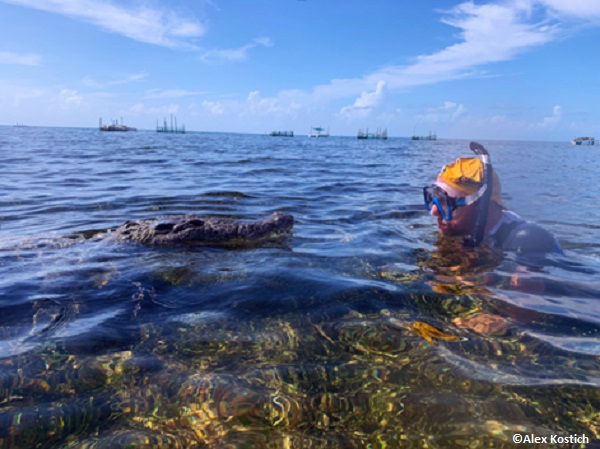Think of the word “shark.” S-H-A-R-K.
The term provokes negativity. For instance, you may consider an attorney whom is often referred to in this unflattering manner. When you think of the fish, the subject can be polarizing. It strikes dread in some and devotion in others. But whether you’re fearful of swimming in the ocean or you dive with the greatest predator known, there’s a word that bridges the love and the hate for many: FASCINATION.
No doubt about it, sharks are a fascinating species. Whether it’s their ancient design, their presumed invincibility or their capability to harm us, we’re awestruck by sharks. So much so, Discovery Channel has built a ratings behemoth and brand in their name known as Shark Week. In case you’ve lived on another planet since Shark Week began in 1987, this programming event occurs every August when we’re treated to a week of shark-themed shows.
Say what? To a lifelong shark lover like myself, what could be better? Remember the first time you saw Air Jaws with its humongous great whites leaping out of the water like rockets to snag seals in South Africa? How do they do that? Incredible!

Though Air Jaws and its sequels thrilled us, tortuous may be the best description of Shark Week’s more recent tendency to air cheesy and gory reenactments of shark attacks. Or the mess that was 2013’s Megalodon: The Monster Shark Lives. This supposed documentary claimed the extinct and largest predatory shark that ever existed was recently spotted in South Africa. The day after the show aired we found out it was more of a mockumentary. Social media exploded with complaints of fraud and misinformation.
But even with Megalodon, a week of shark-themed shows is still a fantastic idea, right? Yes, especially when the cable channel’s stated goal was to raise awareness and respect for sharks. After the release of Jaws, sharks couldn’t garner a worse reputation throughout the late 70s and well into the 80s. They direly needed something to reverse the bad publicity and stop the revenge killings of great whites sparked by the movie.
Fast forward 27 years. I’m left wondering if Discovery’s original objective succeeded. Have they raised the profile of sharks? Indeed. Sharks are a hot topic and commodity with Discovery nabbing great ratings and attention with every outing. 2013’s batch of shows even added a late night talker to discuss all things shark.
But have they helped raise the general viewers’ respect for this animal? That remains in question. However, when a show is titled, Great White Serial Killer, I tend to think not. Really, Discovery? In 2013? At the time this aired, I grumbled, shook my head and sat back to take it in.
Even if you didn’t watch this particular program, its title provokes negative images. Fish are killers that purposefully stalk man? For anyone who knows anything about sharks, this behavior is patently untrue. It’s this same sensationalistic fear-mongering that the media resorts to when reporting shark attacks. Yet, we hear of every shark interaction as if they’re out to get us. Yep, business as usual. Blame the shark. It’s never the swimmer or diver’s error or activities, water conditions, etc., that are to blame.
Most importantly I ask, has Discovery communicated the urgent plight sharks face and the responsibility we have to protect them? The answer is a resounding no!
If you’re possibly wondering what threats there are to such a powerful fish, here’s a list: Overfishing (recreational and non-recreational, targeted for fins, meat, liver, cartilage, jaws); Bycatch (untargeted sharks caught in nets meant for tuna/swordfish, for example); Pollution, habitat destruction, culling (targeted killing occurring as we speak in Western Australia, North South West Australia and Queensland Australia; South Africa; implemented in years past in Hawaii and being considered again in Brazil), and finning (severing fins of live sharks and rays and dumping carcasses at sea by the millions yearly to supply the shark fin soup trade).
Finning has been illegal in most parts of the world beginning in 1993, six years into Shark Week’s run. It was already a major threat to shark and ray populations before the show’s inception in 1987. Yet, I don’t recall hearing one word uttered to this effect for practically the show’s entire run. Because of my avid interest in sharks, I was aware of the problem. Does the general viewer know about the issues? I doubt it.
Whatever the inaccuracies, I thought things might change with 2006’s Sharkwater movie. But in the years following its release, I don’t recall hearing the word finning mentioned on Shark Week, much less any reference to the mass killings, going on every day of every year to feed the lucrative shark fin trade.
I had hoped Sharkwater might air during Shark Week at some point but alas, no. Keep in mind the movie never enjoyed a wide release. Though it was a film festival sensation, you had to seek it out if you wanted to see it. Chances are, if you were looking for Sharkwater, you already knew what finning was, etc. The only way I saw it was by buying the DVD.
Though I thought I’d seen one or two quick commercials pertaining to shark conservation in 2011, I can find no confirmation of this. 2012 brought us How Jaws Changed the World. That included a very brief interview with Shark Savers (now part of WildAid) founder Wendy Benchley speaking of her and her husband Peter’s longtime conservation efforts.
Finally! In 2012, after hundreds of hours of airtime, we get acknowledgment there’s a problem! It only took 25 years. Hopefully, sharks won’t pay the price for your gross inaction, Discovery.
The cable channel claims four references to finning were made in 2013’s collection of shows. Are we on a roll? What can we expect in 2014? I hope the petition going around calling for more shark conservation-minded material made it to the suits at Discovery.
Aside from rights issues, why can’t decision makers balance things out on Shark Week by airing Lesley Rochat’s documentary, Sharks: In Deep Trouble, for instance?
Is it just a monetary issue? Or is Discovery afraid to show animals essentially being skinned alive when children may be watching? If that’s the case, why don’t they have a problem airing endless hours of real and reenacted shark attacks? This won’t give sharks a better name; it incites fear, and it gives the impression that interaction with sharks is common instead of a rare event.
On a positive note, there seems to be more sympathy for sharks than ever, and the worldwide protests against the West Australian shark cull is evidence. How a protected and migratory species like the great white can be exempted from protection in 2014 without scientific evidence proving it is the right course of action is dumbfounding.
It is wrong and will harm our oceans. Nevertheless, the program has proceeded. And unfortunately, I predict no mention of this organized kill being carried out today, and possibly for years to come, will be made on Shark Week in 2014.
Also a plus, finning is less of a concern these days due to the illegality and higher public awareness. This is thanks to decades of work, but education of Asian cultures and youth around the world must continue. The ocean is vast and illegal fishing and finning will persist.
If finning isn’t the worst issue facing sharks today, what is? Overfishing and bycatch. Well-managed shark fisheries exist in the United States where catch is limited. This is not the case in the European Union where no limits are placed on the amount of mako and blue sharks taken, for example. Again, sharks and rays are caught for everything from meat, fins, liver, cartilage, and trophies; which are then used in food, clothing, make-up, medicine, supplements, souvenirs and even dog treats!
This is a tremendous demand put on late and low-reproducing animals. So think before you buy, eat or fish. Help decrease demand. And, hopefully, Discovery Channel will do its part in the future to help these fish which have become synonymous with their name as well as their meal ticket.



Comments are closed.